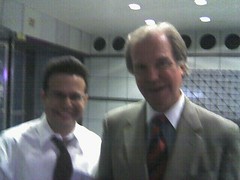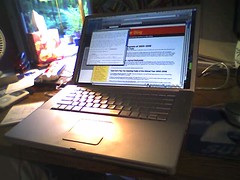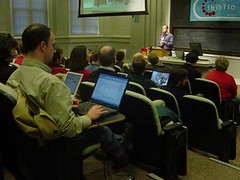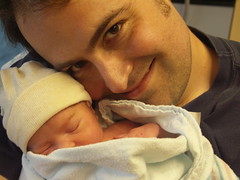 Chris Lehmann was interviewed yesterday on what appears to be the NEW EdTechTalk, sub-titled, 21st Century Learning Webcast — anchored now by Alex Ragone and Arvind Grover.
Chris Lehmann was interviewed yesterday on what appears to be the NEW EdTechTalk, sub-titled, 21st Century Learning Webcast — anchored now by Alex Ragone and Arvind Grover.
Principal of the soon to open, and certainly to be “something new,” high school, the Science Leadership Academy in Philadelphia, Lehmann answered some pointed questions, such as, “What’s an old english teacher doing, leading a science focused high school?” Correction: if you met Chris, you’d swear he isn’t more than 28, but he is. The picture to the right is Chris with MIT Media Lab Director, Nicholas Negroponte.
A podcast of the interview is now available, but what I’d like to point your attention to is something that Chris mentions in one of yesterday’s Practical Theory blog entries.
Why wouldn’t we have our kids doing this? (Answer — we should have our kids doing this!)
Lehmann continues…
With Skype and some good add-on software (and a quick google search of “Record Skype Calls” found several solutions worth trying), our kids can be up and podcasting interviews in no time. When our kids are researching, wouldn’t they want to use this technology to talk to experts in the field? When they are publishing their 21st Century research projects, now they can pull in audio clips of those experts into their final presentations. What does it mean that we can partner with other schools out there to create these podcasts with these tools?
Podcast on EdTech Talk – Practical Theory
I’d like to add another angle to this. Chris’ enthusiasm about his experience leads me to wonder what students might gain from being interviewed themselves. As students complete their research papers, Hyperstudio Stacks, web sites, or any other kind of research-based information product, we should begin to refer to the young scholars as experts in that area, and offer them up for interview by other classes, in other locations. The distances could be geographic. They may also be age, where younger students in another class, use Skype to interview an older students who just completed research in an area of curricular interest.
What do you think?
technorati tags:chrislehmann, edtechtalk, skype, sla
Blogged with Flock


 School’s out for most of us. Educators across the northern hemisphere are relaxing for the first time in months, looking forward to a month or a little more of R&R, sitting by the pool in sunglasses, or taking a vacation or a fact-finding tour of Paris, London, Tokyo, or some other exotic locale that they teach about. But they aren’t blogging, and they aren’t e-mailing. It’s quiet.
School’s out for most of us. Educators across the northern hemisphere are relaxing for the first time in months, looking forward to a month or a little more of R&R, sitting by the pool in sunglasses, or taking a vacation or a fact-finding tour of Paris, London, Tokyo, or some other exotic locale that they teach about. But they aren’t blogging, and they aren’t e-mailing. It’s quiet. There are many ways that we might take NECC to new dimensions through its wireless access to the World Wide Web, especially version two of this digital space. But perhaps the simplest and most potent way is by blogging the sessions that you attend. So here are some steps and pointers for blogging a conference session. I’m just thinking off the top of my head here, so please comment with additional suggestions.
There are many ways that we might take NECC to new dimensions through its wireless access to the World Wide Web, especially version two of this digital space. But perhaps the simplest and most potent way is by blogging the sessions that you attend. So here are some steps and pointers for blogging a conference session. I’m just thinking off the top of my head here, so please comment with additional suggestions. Several days ago, Andy Carvin blogged about the June 2nd birth of his daughter, Kayleigh. In his article, he speculated about the advances in educational technology that will likely occur while his little one is in school.
Several days ago, Andy Carvin blogged about the June 2nd birth of his daughter, Kayleigh. In his article, he speculated about the advances in educational technology that will likely occur while his little one is in school.